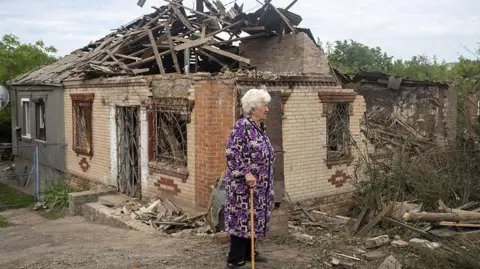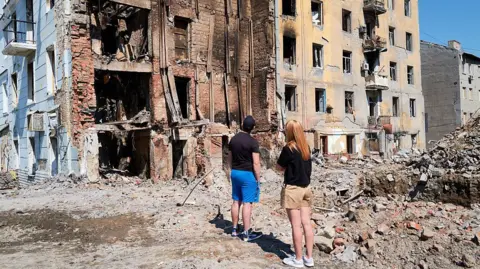Explore the high-stakes consequences for Ukraine if Donbas is handed to Putin, from national betrayal to political and military turmoil.

Life for those living close to the front lines in the Donbas region face a daily struggle for survival
Days before his Alaska showdown with Vladimir Putin, Donald Trump stunned the world by floating ‘land swaps’ as a peace condition – a phrase that left Ukrainians reeling. What could it possibly mean? Giving up Russian land in exchange for territory seized by force?
Now, as President Zelensky heads to Washington, the chilling reality is clear: Trump reportedly plans to pressure Ukraine into surrendering all of Donetsk and Luhansk – the heart of the Donbas – while Russia freezes the rest of the front line, echoing Putin’s own proposal.
Luhansk is nearly lost already, and Ukraine clings to only 30% of Donetsk, holding key cities at a horrific cost of tens of thousands of lives. Rich in minerals and industry, Donbas is not just land – it’s a lifeline. Ukrainian historian Yaroslav Hrytsak warns: giving it up now would be nothing short of a national tragedy.
“This is Ukrainian territory,” Mr Hrytsak said. “And the people of these regions – particularly the miners – played a huge role in the strengthening of the Ukrainian identity.”
The region had also produced “famous politicians, poets and dissidents”, he said. “And now refugees who will not be able to return home if it becomes Russian.”
Since 2014, at least 1.5 million Ukrainians have fled the Donbas, with over three million trapped under Russian occupation. Another 300,000 cling to the small areas still under Ukrainian control.
Life near the front line is a daily nightmare. Andriy Borylo, a 55-year-old military chaplain in Sloviansk, described shells landing next to his house over the weekend. ‘There is a feeling of resignation and abandonment. Someone has to protect us. But who?’ he asked, blaming Trump’s Alaska talks rather than Zelensky. ‘They are taking everything from me. It is a betrayal.’
Zelensky has vowed never to hand over the Donbas for peace, and trust in Russia to honor any deal is virtually nonexistent. Unsurprisingly, around 75% of Ukrainians reject ceding even a single inch of land, according to the Kyiv International Institute of Sociology.

Ukraine is estimated to have held onto about 30% of the Donetsk region, including several key cities and fortifications
But Ukraine is also deeply fatigued by war. Hundreds of thousands of soldiers and civilians have been killed and wounded since the full-scale invasion began. People are craving an end to suffering, particularly in the Donbas.
“You ask about the surrender of the Donetsk region, well, I measure this war not in kilometres but in human lives,” said Yevhen Tkachov, 56, an emergency rescue worker in the Donetsk city of Kramatorsk.
“I’m not ready to give tens of thousands of lives for several thousand square kilometres,” he said. “Life is more important than territory.”
For some, this is what it comes down to in the end. Land versus life. It leaves President Zelensky “at a crossroads with no good route in front of him”, said Volodmyr Ariev, a Ukrainian MP from the opposition European Solidarity party.
“We don’t have enough forces to continue the war for an unlimited time,” Ariev said. “But if Zelensky were to concede this land it would be not only a breakdown of our constitution, it could have the hallmarks of treason.”
And yet, it is not clear in Ukraine by what mechanism such an agreement could even be reached. Any formal handover of the nation’s territory requires the approval of the parliament and a referendum of the people.
More likely would be a de facto surrender of control, with no formal recognition of the territory as Russian. But even in that event, the process is not well understood, said Ukrainian MP Inna Sovsun.
“There is no real understanding as to what the procedure should be,” she said. “Does the president simply sign the agreement? Does it have to be the government? The parliament? There is no legal procedure set up because, you know, the constitution writers didn’t think about this.”
Things may become clearer after Zelensky speaks with Trump in Washington on Monday – the Ukrainian leader’s first visit to the White House since a disastrous clash in the Oval Office in February. Amid the unhappiness left by the Alaska summit, there was one possible glimmer of good news for Ukraine.
Trump appeared to reverse his position on security guarantees after the summit, suggesting he was ready to join Europe in offering Ukraine military protection from future Russian attacks.
How the Trump-Putin summit unfolded
Polling shows one thing clearly: for Ukrainians, security guarantees are non-negotiable in any discussion of territory. ‘People in Ukraine will accept various forms of security guarantees,’ said Anton Grushchetsky, director of Kyiv’s International Institute for Sociology, ‘but they require them.’
For Yevhen Tkachov, the emergency worker in Kramatorsk, any exchange of land must come with ‘real guarantees, not just written promises.’ He added bluntly: ‘Only then, more or less, I am in favour of giving Donbas to Russia. If the British Royal Navy is stationed in the port of Odesa, then I agree.’
Amid talks of peace, often in the deal-making style of President Trump, the human cost risks being forgotten. Donbas is home to countless Ukrainians whose lives have already been shattered by a decade of war.
‘We are not just talking about culture, politics, or demographics,’ said historian Vitalii Dribnytsia. ‘We are talking about people.’ Donetsk may lack the glamour of Odesa, but it is Ukraine. ‘Any corner of Ukraine, regardless of cultural significance, is Ukraine,’ he emphasized.